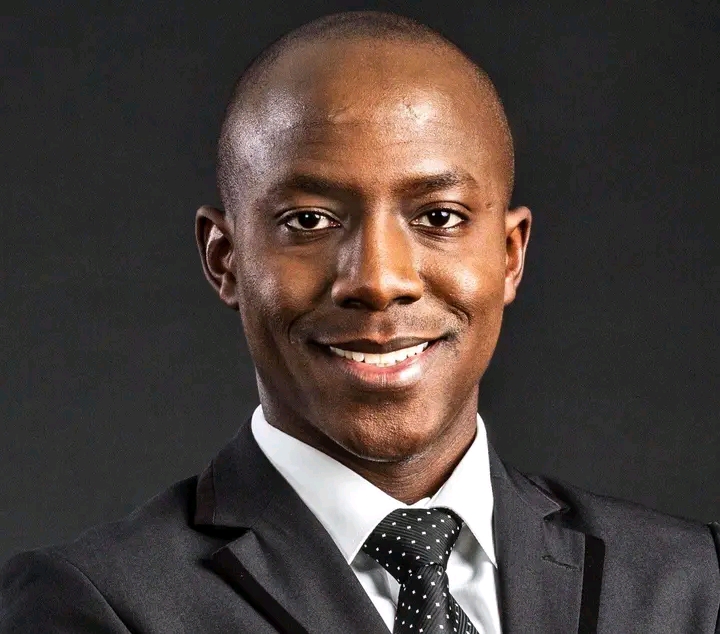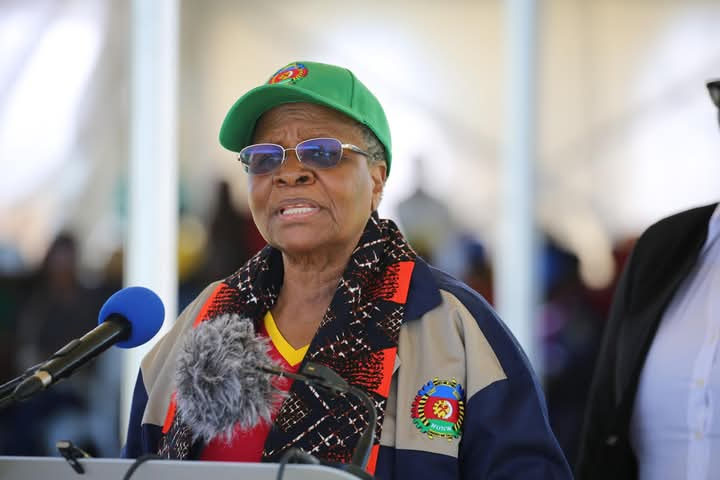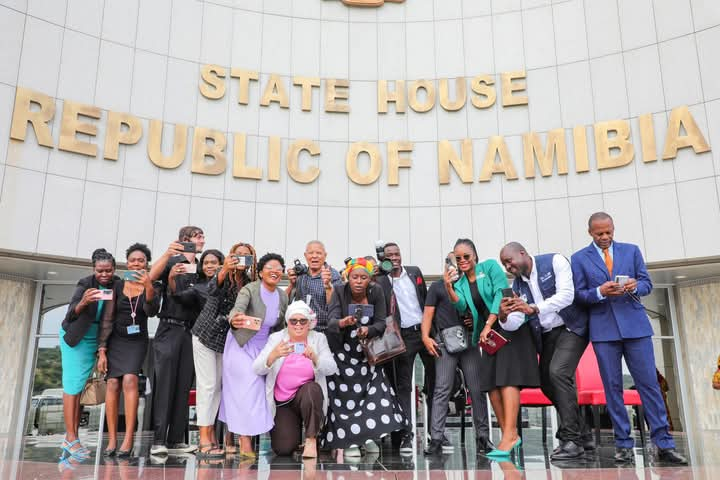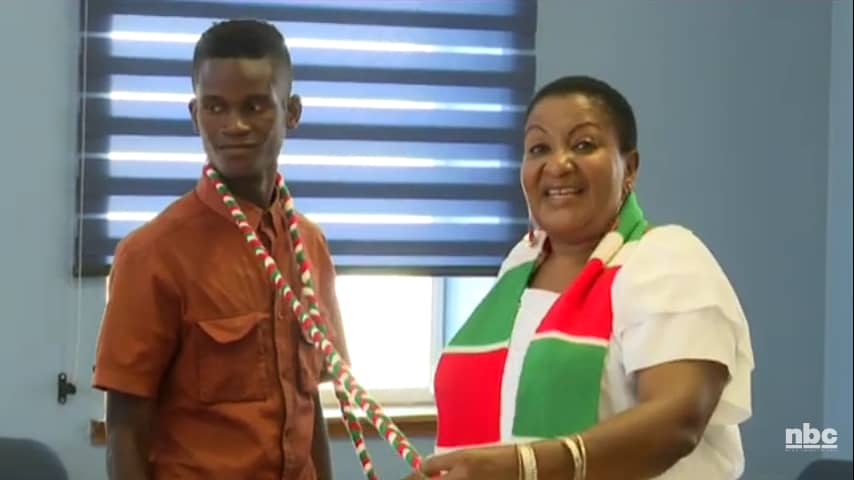INSPIRED by her hero Rafael Nadal, 13-year-old Mary Aribes dreams of playing at Wimbledon one day.
Although England may be a long, long way from the dusty streets of Swakopmund’s Mondesa township, Mary took a major step in her tennis career recently when she was selected for the Namibian National Junior Tennis team. She crossed the border of her home country for the first time to compete against South Africa’s top players in an inter-provincial tournament.Winning six of her eight matches has taken her self-confidence to a new level.Mary is but one of many success stories of a private initiative started in December 2003 called Mondesa Youth Opportunities (MYO).A PLAN COMES TOGETHER In order to establish a long-term development programme to give children hope and opportunities that would otherwise not have been available to them, volunteer teacher from America Rob Myres and a tennis coach from Swakopmund Alta Myburgh joined forces.They were involved with the Arandis Youth Tennis Association and the Swakopmund Tennis Academy respectively.In less than four years, MYO has seen tremendous growth with 100 children between grades four and seven from six primary schools.It has become widely recognised as a programme with significant benefits for its participants.”We aim to develop and foster an environment where children can learn and grow in areas that are vital to their success in life, and to create a community of physically and emotionally healthy, engaged and caring youth,” said Myres, who has since returned to the US from where he spearheads fundraising efforts.Although tennis is but one of a variety of focus areas of MYO, the players have already become a force to be reckoned with in junior tennis in the country.Fourteen of them are included in the latest age-group rankings of the Namibian Tennis Association, with Paulina Shikongo (12) taking the highest position at number three in the girls’ u/12 category.Apart from Mary, Paulina and Frieda Mukufa (12) were also selected for the Namibian team that travelled to South Africa recently.Mary and Frieda are ranked seventh and ninth in the girls’ u/14 group.LIFE SKILLS For Myres it is important to point out that MYO is not just another day-care centre, but instead offers academic support programmes, life-skills mentoring and dedicated sports activities to achieve its aims.Three fulltime teachers, a manager, a fulltime tennis coach and a number of volunteers ensure the smooth running of the various activities.Each child spends at least 10 hours a week (400 hours a year) at the MYO premises after school.Their time is divided into about three hours of tennis coaching, three hours of academic tutoring and four hours of other activities such as music and education on hygiene, health, nutrition and HIV-AIDS.This year saw the introduction of chess by teacher Casey de Kalb from Australia.It has become such a popular activity that the MYO Mindmasters Club was formed and 37 students registered with the Namibian Chess Federation.”We began handing out chess boards at lunch time to keep the kids occupied and they took to it like candy,” says De Kalb.The plan is to start entering tournaments to give children not so good at tennis a chance to represent MYO in another area.Sport activities have also been expanded to include more team-related sports such as volleyball and basketball.The music programme incorporating African drums and recorders is also very popular among the children.ACADEMIC IMPETUS The extra academic tutoring offered has also proved to be highly successful.The after-school programme follows a structured approach, taking the syllabus of each grade and focusing on the gaps not covered at school.According to Myres, MYO children scooped up 50 per cent of academic prizes at their respective schools at the end of last year.The enthusiasm and eagerness of the children are qualities the teachers are quick to point out.”These children are the most amazing beings I have ever encountered,” says Katie Cleary, MYO Field Manager.”They are loving, giving, eager to learn and so grateful.”Their enthusiasm on the tennis court is equally inspiring for tennis coach Julian Dausab, “They are hard workers, appreciate every effort and put in 100 per cent every day – come cold wind or hot weather.”These are exactly the qualities Myres wanted from children joining MYO.Every year six children in grade four are selected from the different primary schools to join.”We are looking for kids who are enthusiastic and who an interest in bettering themselves.”While attendance has been excellent, averaging at 88 per cent, some newcomers have unfortunately dropped out this year.Cleary says they are mostly girls, as parents said they needed them to help out at home with domestic chores, not realising the long-term impact of the programme on their children.Fortunately for Mary, who lives with her mother and two siblings, she receives a lot of encouragement.She has not only become a star tennis player, but her school marks have improved, especially in English.”My mom is very proud of me and what I have achieved.”* Maggi Barnard is a freelance journalistShe crossed the border of her home country for the first time to compete against South Africa’s top players in an inter-provincial tournament.Winning six of her eight matches has taken her self-confidence to a new level.Mary is but one of many success stories of a private initiative started in December 2003 called Mondesa Youth Opportunities (MYO). A PLAN COMES TOGETHER In order to establish a long-term development programme to give children hope and opportunities that would otherwise not have been available to them, volunteer teacher from America Rob Myres and a tennis coach from Swakopmund Alta Myburgh joined forces.They were involved with the Arandis Youth Tennis Association and the Swakopmund Tennis Academy respectively.In less than four years, MYO has seen tremendous growth with 100 children between grades four and seven from six primary schools.It has become widely recognised as a programme with significant benefits for its participants.”We aim to develop and foster an environment where children can learn and grow in areas that are vital to their success in life, and to create a community of physically and emotionally healthy, engaged and caring youth,” said Myres, who has since returned to the US from where he spearheads fundraising efforts.Although tennis is but one of a variety of focus areas of MYO, the players have already become a force to be reckoned with in junior tennis in the country.Fourteen of them are included in the latest age-group rankings of the Namibian Tennis Association, with Paulina Shikongo (12) taking the highest position at number three in the girls’ u/12 category.Apart from Mary, Paulina and Frieda Mukufa (12) were also selected for the Namibian team that travelled to South Africa recently.Mary and Frieda are ranked seventh and ninth in the girls’ u/14 group.LIFE SKILLS For Myres it is important to point out that MYO is not just another day-care centre, but instead offers academic support programmes, life-skills mentoring and dedicated sports activities to achieve its aims.Three fulltime teachers, a manager, a fulltime tennis coach and a number of volunteers ensure the smooth running of the various activities.Each child spends at least 10 hours a week (400 hours a year) at the MYO premises after school.Their time is divided into about three hours of tennis coaching, three hours of academic tutoring and four hours of other activities such as music and education on hygiene, health, nutrition and HIV-AIDS.This year saw the introduction of chess by teacher Casey de Kalb from Australia.It has become such a popular activity that the MYO Mindmasters Club was formed and 37 students registered with the Namibian Chess Federation.”We began handing out chess boards at lunch time to keep the kids occupied and they took to it like candy,” says De Kalb.The plan is to start entering tournaments to give children not so good at tennis a chance to represent MYO in another area.Sport activities have also been expanded to include more team-related sports such as volleyball and basketball.The music programme incorporating African drums and recorders is also very popular among the children. ACADEMIC IMPETUS The extra academic tutoring offered has also proved to be highly successful.The after-school programme follows a structured approach, taking the syllabus of each grade and focusing on the gaps not covered at school.According to Myres, MYO children scooped up 50 per cent of academic prizes at their respective schools at the end of last year.The enthusiasm and eagerness of the children are qualities the teachers are quick to point out.”These children are the most amazing beings I have ever encountered,” says Katie Cleary, MYO Field Manager.”They are loving, giving, eager to learn and so grateful.”Their enthusiasm on the tennis court is equally inspiring for tennis coach Julian Dausab, “They are hard workers, appreciate every effort and put in 100 per cent every day – come cold wind or hot weather.”These are exactly the qualities Myres wanted from children joining MYO.Every year six children in grade four are selected from the different primary schools to join.”We are looking for kids who are enthusiastic and who an interest in bettering themselves.”While attendance has been excellent, averaging at 88 per cent, some newcomers have unfortunately dropped out this year.Cleary says they are mostly girls, as parents said they needed them to help out at home with domestic chores, not realising the long-term impact of the programme on their children.Fortunately for Mary, who lives with her mother and two siblings, she receives a lot of encouragement.She has not only become a star tennis player, but her school marks have improved, especially in English.”My mom is very proud of me and what I have achieved.”* Maggi Barnard is a freelance journalist
Stay informed with The Namibian – your source for credible journalism. Get in-depth reporting and opinions for
only N$85 a month. Invest in journalism, invest in democracy –
Subscribe Now!










